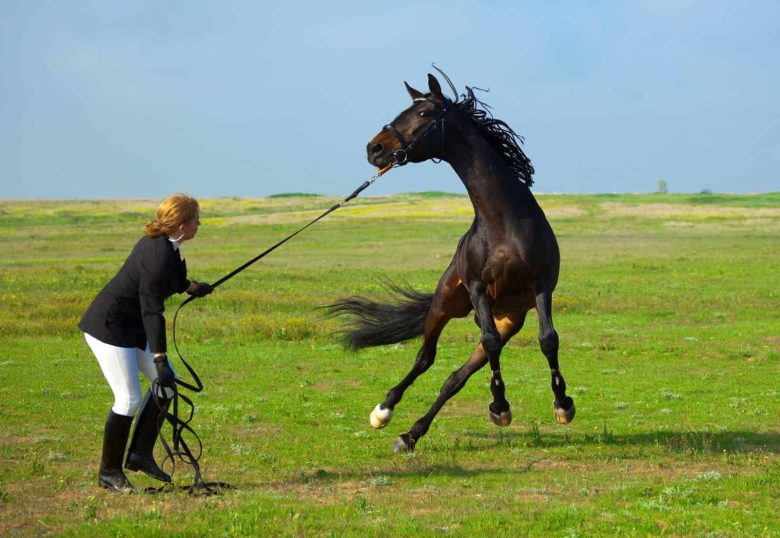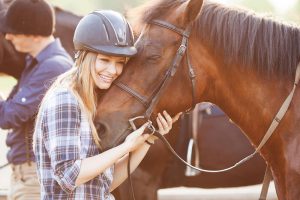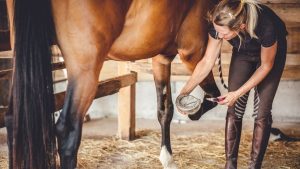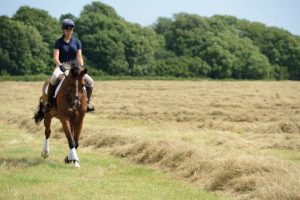Horses are beautiful and strong, they are more than just pets; they are friends. The bond between a horse and its handler should be understood and discussed, just like any other bond. However, behavioral problems can arise that make the bond more difficult to maintain. This article describes common behavioral problems in horses, including their causes and how to solve them. This shows how complex horse psychology is.
1. Understanding Horse Behavior:
Horses are prey animals, which means they have developed the ability to respond quickly to danger. They do it out of habit, because it helps them survive and because it is deeply ingrained in their minds. Understanding this part of their personality is important when dealing with behavioral problems because seemingly unwanted behavior is often a response to stress, anxiety, or pain. The first step in troubleshooting is recognizing the signs of worry and figuring out what’s causing it.
2. Common Behavioral Problems and Their Causes:
- Aggression
Aggression in horses can manifest itself in biting, hitting, or attacking. This can be scary, but it is usually a response to fear, not having enough social interaction, or figuring out who is responsible in a group dynamic. Aggression can also stem from abuse or neglect as a child, making the animal suspicious of people.
- Stand Still
Trainers can become frustrated if a dog hesitates or refuses to move. People often do this when they feel scared, in pain, or uncomfortable. This could be due to a scary object on the road, a bad experience in a certain area, or a physical problem such as back pain or a saddle that doesn’t fit properly.
- Being Shy or Talking Loudly
Due to their inherent nervousness, horses frequently flee or become startled by loud noises or sudden movements. Horses do this because they are prey and know that moving quickly can mean the difference between life and death. This is a normal reaction but it can be dangerous if it results in an uncontrolled run.
- Separation Anxiety
Horses are social animals and they can develop separation anxiety when they are away from other horses or their friends. This nervousness can manifest as pacing, yelling, or acting inappropriately. The main reason is that horses naturally want to be around other horses to feel safe.
- Get Rid of Bad Habits
Some stable vices include plagiarism (chewing on a fence, stable, or other objects and inhaling air), weaving (swaying from side to side), and stable walking (walking around the stable). This behavior is often a sign of boredom, stress, or anger because it is limiting.
3. Dealing with Behavioral Problems:
- Understanding and Patience
Finding out why your horse is underperforming is the first step to solving the problem. You must be patient, understand how your horse is feeling, and be willing to see things from the horse’s perspective. Building trust and strong connections is the key to solving many behavioral problems.
- Weekly Training
Many behavior problems can be avoided if you teach and deal with them consistently. By setting clear rules and standards and using positive reinforcement, you can train your horse to perform well. Training should always vary depending on the needs and personality of each horse.
- Improve the Environment
By improving the environment and ensuring there are enough participants, problems such as stopping bad habits can be addressed. Horses need space to walk around and get to know other horses. Give them things, change their routine, and make sure they have friends who can help relieve stress and boredom.
- Expert Help
A professional should examine some behavioral issues, especially those resulting from stress or pain. A veterinarian can rule out or treat underlying health problems, and an equine behaviorist or experienced trainer can provide specific advice for your horse based on its needs.
- Build Trust
Building trust is an important part of solving behavioral problems. This means that you spend valuable time with your horse, not only during training but also while feeding, grooming, or simply being present. If you trust your horse, he will feel safe and comfortable, which will reduce his stress and anxiety.
4. Stop Behavioral Problems:
Treatment is not always better than prevention. Understanding horse psychology, giving them a fun and safe place to live, and developing a trusting relationship with them can help you avoid many behavioral issues. A lot also depends on regular check-ups, good training, and making friends from an early age.
5. Conclusion:
Behavioral problems in horses can be complex and often require multiple answers. Understanding the cause, coupled with perseverance, patience, and expert help, can lead to positive results. Eliminating and solving these problems starts with the relationship between the owner and the horse, which should be based on trust, respect, and understanding. By strengthening this connection, we can protect the health of these beautiful animals and enjoy the rich and rewarding relationships they provide.
FAQs:
1. How do you know if a horse is worried or stressed?
When a horse is stressed or anxious, he may sweat, have an increased heart rate, become restless, pace himself, and avoid things or people by turning away or refusing contact. If a horse is worried, he may also change the way he eats or drinks.
2. What’s the best way to deal with a mean horse?
When dealing with an angry horse, you need patience, understanding, and sometimes the help of a professional trainer or behaviorist. It can help to set clear boundaries, train the horse consistently, and ensure its basic needs are met. Everyone’s safety should always come first, and punishing violent behavior can make matters worse.
3. Does what a horse eats change its behavior?
Yes, what your horse eats can have a major impact on its behavior. Overfeeding, nutritional imbalances, or feeding energy-rich feed to a horse that is not busy enough can cause the horse to act hyperactive or exhibit unpredictable behavior. By talking to your veterinarian or equine nutritionist, you can ensure your horse is getting the right nutrition for his needs.
4. How important is exercise to deal with mental health problems?
Horses with social problems need a lot of exercise. Not only does it help eliminate excess energy, but it also keeps your mind active. Regular, safe exercise helps reduce stress, boredom, and the chance of developing bad habits.
5. Can behavioral problems be completely resolved?
Many behavioral problems in horses can be greatly reduced or completely resolved with the right approach, including identifying the underlying cause, consistent training, managing the horse’s environment, and sometimes medical attention. But how well these problems are resolved varies from horse to horse and situation to situation.



